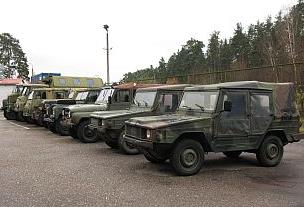Budget, Financial Services, Latvia, Legislation, Security, Technology
International Internet Magazine. Baltic States news & analytics
Wednesday, 24.04.2024, 19:44
Growth in Latvia's defense budget from 2004 to 2008 had little to do with national defense
 Print version
Print version |
|---|
When Latvia joined NATO in 2004, the country's defense budget was EUR 133 million. By 2008, it increased to EUR 380 million, constituting 1.6% of GDP – on paper. At the moment, Latvia's defense budget is EUR 225 million or 0.91% of GDP.
The defense budget growth from 2004 to 2008 would have looked differently if spending not associated with defense was not included in the budget.
For instance, EUR 3.7 million from the defense budget went to the construction of a bridge over the Gauja River in Adazi. However, the only way the bridge may be associated with the army is that it is en route to the Adazi Garrison.
Hundreds of thousands of lats spent on the organization of president's foreign visits, millions that went to the Constitutional Protection Bureau, the cost of the Bank of Latvia security, the Border Guard – these are just a few of the items that were included in the defense budget so it would look bigger, percentage-wise. Also, until 2008, several hundred thousand euros were allotted from the defense budget for restoration of monuments, construction of a telescope at the Ventspils College, publishing of Imants Ziedonis' book, even staging of a theater play "King Nameitis" – also under the auspices of NATO.
The defense budget was also closely associated with sports. Thanks to politicians' favorable attitude, various sport federations and private sport clubs were receiving hefty funding from the budget – some clubs even up to EUR 0.5 million annually. Once the crisis struck, these spending positions were cut and have not been renewed since.
Also, the Defense Ministry supported the construction and renovation of gyms and other sport facilities across the country. Such was the political agenda at the time, says the Defense Ministry's State Secretary Janis Sarts.
However, the broad interpretation of defense spending was characteristic of not only Latvian politicians. For instance, the gendarmery was included in France's defense budget.
"We could use this old definition [of NATO] until some point to prove that all this [spending] is in accordance with the definition. I believe that this creativity by a number of countries, including the tampering with the defense budget and its percentage of GDP, resulted in the narrowing of the definition, which now describes very precisely what can be included in the budget and what can not," said Sarts.
All said spending items have been removed from the defense budget for five years now. At the moment, the defense budget covers the Defense Ministry and the ministry's institutions, National Armed Forces, cyber security agency CERT.LV, Latvian Geospatial Information Agency, Youth Guard, and the cost of the president's security guards – but not his foreign visits or other expenditures.
At the moment, when promises are being made about a larger defense budget, the army is expecting new armored vehicles, hopes to develop special units' combat readiness and engineering and technical capacities. In the meantime, dozens of well-trained soldiers are leaving the army, most because of the low salaries. Soldiers' monthly wages were cut EUR 100 to EUR 300 on the average in 2009, and the wages have increased by only about EUR 10 since. If there is more money, it will be primarily invested in soldiers.
"The increase in defense budget by 0.2% annually until it reaches 2% of GDP depends on the state budget. If the state budget is not developing successfully, this plan may be revised, in which case all these statements and promises about allotting 2% of GDP to defense are false," says Saeima Defense, Internal Affairs and Corruption Prevention Committee's head Ainars Latkovskis (Unity).
On the other hand, Saeima National Security Committee's head Valdis Zatlers (Reform Party) says that not increasing the defense budget is impossible. "The resolve is clear. And the level of threats in the world is high enough to keep populism out."
Whereas National Armed Forces Commander, Lieutenant General Raimonds Graube says that any increases in the defense spending must first of all concern soldiers' wages.








 «The Baltic Course» Is Sold and Stays in Business!
«The Baltic Course» Is Sold and Stays in Business!

